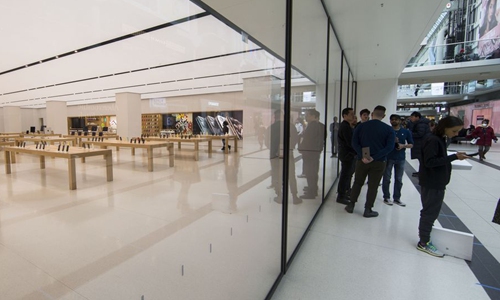
People are seen outside a closed Apple store in Toronto, Canada, on March 14, 2020. Apple will close all its stores worldwide except those in China until March 27 in response to the spread of COVID-19, said Apple CEO Tim Cook on Saturday. (Photo by Zou Zheng/Xinhua)
Apple’s online stores in China are limiting product purchases, with each customer only able to buy two iPhone models. Industry expert said that such a rare approach adds growing uncertainty to Apple’s performance and that will eventually lead to at least a 10 percent cut in Apple’s global revenue as the pandemic worldwide continues.
The Global Times learned that Apple’s online stores in many countries including China and the US are limiting iPhone models including iPhone 11, iPhone 11 Pro, iPhone XR, iPhone 8 and iPhone 8 Plus. The AirPods Pro is also limited.
A customer service employee of iPhone confirmed on Friday that the company is limiting purchases to ensure its products are available for every buyer when there are inadequate stockpiles.
The person did not say if the limit is due to the disrupted supply chain amid the pandemic.
However, the supply chain issue has been a growing conspicuous headache to multinational companies like Apple, and the most optimistic estimate is that Apple's supply chain may return to normal in the second half of this year, Liang Zhenpeng, a senior Beijing-based industry analyst, told the Global Times on Friday.
"As the pneumonia spreads globally, it is not clear whether sales can recover in the second half, as the pandemic in some countries is getting worse," Liang said, predicting that this year, Apple's global sales will be down at least 10 percent from a year earlier.
According to Nicole Peng, who tracks the smartphone sector at research firm Canalys, the two main issues on Apple's supply side are first, delays in logistics and transportation of finished products, given that cargo capacity is largely reduced between China and oversea countries due to massive cuts in freight. Second, for overseas engineers to travel into China to support production is difficult, due to travel restrictions across the world.
Nevertheless, Peng noted that the smartphone supply chain and assembly plants' production are recovering faster than was expected in February, which was 70-80 percent by March and 100 percent in April.
"The recent check shows 80-90 percent of normal capacity pre-outbreak was achieved. The risk of further supply chain disruption is low," Peng said.
For Apple, uncertainty on revenue is no longer on the supply side but mainly on the demand side given the retail shutdowns and impact on consumers’ purchasing power, Peng said.
The greater China stores have reopened, but retail stores in the rest of the world as well as phone retail outlets were forced to close due to lockdowns, making consumers reliant on online purchases.
"What happened in China in the past two months also shows, consumers are likely to hold up spending on any non-critical items," Peng said.
Global Times


